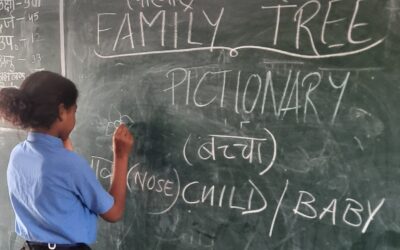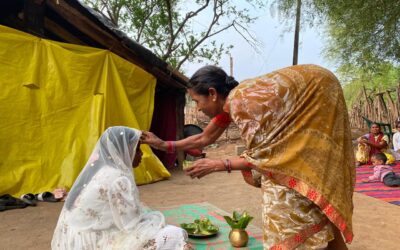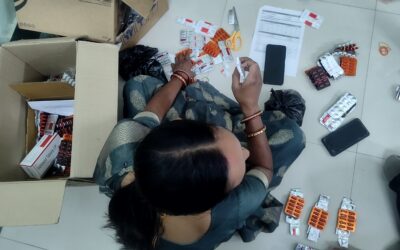Image: Doing sessions and discussions with adolescent girls on Menstrual Health and Hygiene Management
I am working in a community radio station – Nityananda Janavani 91.2 FM in Purulia, West Bengal. Our radio station was already making programs on lots of issues prevailing around our community like Breastfeeding, Immunization, Child Marriage, Gender Equality, Early Pregnancy, Agriculture, superstitions and many more. We came up with another critical issue which was Menstrual Health and Hygiene Management. We did a few episodes on it in the past but never in depth and not in the form of a single program series. To give you a context about my field area, our radio covers an area of 15 km radius. This includes the population of Bengali and Santhali communities.
For the Bengali community, there are other communication mediums available for them in their language but for Santhali community there is none, which results in information gap and a wide population becomes unaware about safe Menstrual Health and Hygiene Practices. I came to know about a lot of problems from my radio colleagues that how the school going girls miss their schools during periods. Some because of shame and fear, some because of pain, some because of the unavailability of sanitary napkins. Many families are so financially weak that they can’t even afford to give pieces of clothes to their girls. Sanitary pads are luxury for them. Many of them who used clothes during periods faced many kinds of problems and infections. They also occurred due to either using the same clothes again and again or not adopting proper practices to make the clothes germ free. They either washed it simply with water from the pond or dried it into the shade.
We did a survey in our community which included 42 adolescent girls, 42 housewives and 14 pregnant women from different GPs. After analyzing the survey data, I found that nearly every housewife used clothes to manage their periods. Using clothes is not a bad choice but according to the analysis report, it was found that the ones who were using clothes were not following hygiene management practices due to which they suffered several issues.
Our major challenge was to reduce the practice of taking bath in rivers and ponds during periods. Nearly every female surveyed took bath in the lakes and rivers during their periods which is a common source of drinking water, bathing and for household works. Most of them never shared or got information from their mothers or female family members regarding their periods before hitting puberty. Neither the mothers ever shared it with their daughters. It was shocking that they usually got the information from their girl-friends which was again not a reliable source of information and resulted in lots of misconceptions and unawareness in the community.
Lots of superstitions were and are still prevailing in the community. They are restricted to touch plants and crops, to enter a temple or kitchen, to touch drinking water, to take medicines during their periods. They even believe eating meat and fish will result in more bleeding and due to which the parents restricted the girls to take a healthy and nutritious diet (that included meat and fish) during the periods.

Community meetings and a video presentation at a village

Volunteer training session with girls in the village
Keeping all these challenges in mind I, my station master and two of our female program producers (one Bengali and one Santhali producer) decided to do community meetings and then based on that we will start a program. Gathering women at one place and discussing a stigmatized topic was a huge challenge. I wanted to use some descriptive, informative but entertaining video so that they can watch it comfortably with everyone.
I used videos from Menstrupedia and Health Phone which helped me a lot. As compared to my female colleagues it was more challenging for me because firstly I was an outsider and that too a male staff. I didn’t know the language efficiently and I was working on a topic which none of us even in the urban areas used to discuss openly. Talking about my personal experience I never discussed menstruation in my family since I had no sister and never cared to discuss with my mother about it or with my female friends. I decided to be a third party and to help the team from the back end. I helped in making 5, 10minute short audio programs for narrowcasting, collecting and presenting videos for community and schools, designing and analyzing survey forms, preparing volunteer training modules and designing radio episodes on it. Soon I was comfortable enough to discuss it with my colleagues, co-fellows and my mentors. We started a program called Hello Periods which included 12 episodes.
Episode1 - Changes in the body during puberty (both boys and girls) Episode2 - Nutrition, what to eat during the adolescent period? Episode3 - Menstruation and why it happens? Episode4 - Feelings that go with growing up (both mothers and daughters) Episode5 - Hygiene Management and Nutrition (how to wash and dry clothes, undergarments. Use of sanitary napkins, cloths and disposal. Taking the bath in ponds, lakes and rivers.) Episode6 - Pain, rest, sleep and medications Episode7 - Myths and conceptions Episode8 - For boys (awareness and to be respectful) Episode9 - hood swings and Hormones Episode10 - How to talk about periods (for mothers and daughters) Episode11 - Shame and fear Episode12 - Conclusion.
By working closely on the issue, I understood what problems the females in rural India are facing. House-wives wanted to use sanitary pads but they can’t afford it due to the financial situations. Most of them, especially girls, are dependent on others for bringing their day to day stuff. Also, low-cost sanitary pads aren’t available in the rural markets, sanitary pad machines do not have pads in schools, colleges and gram panchayat’s offices so people become helpless. No other sources of water or bathrooms are available to take bath (but the common ponds) during periods.
Periods are not even discussed openly with male members of the family which results in shame and girls are bound to dry their undergarments and cloth pads in shade or at night when no one is watching. Schools do not have functional toilets, so girls are left with no options but to not go to school, suffering loss in academics. When we did video presentations in schools lots of girls came out to discuss the issue, it looked like they wanted someone eagerly who can solve their mysteries, answer their questions.
It is necessary to include MHHM in the curriculum of schools. Be it boys or girls – both of them should learn about it so that it could transform from being a taboo.




0 Comments